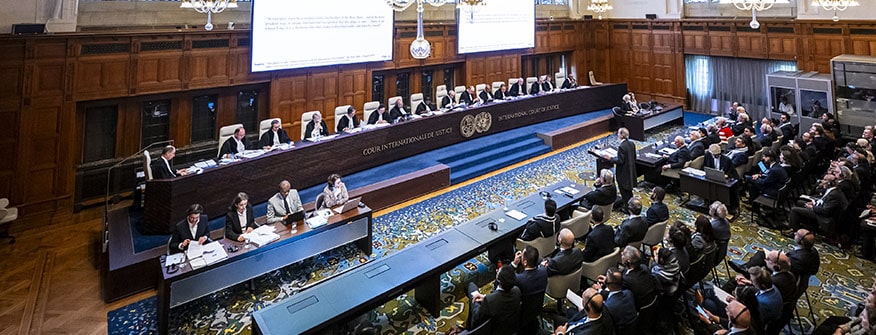 (Pic: International Court of Justice)
(Pic: International Court of Justice)
Israel engaged in ‘process of annexation’ – AG
The Attorney General (AG) Rossa Fanning SC has told the International Court of Justice (ICJ) that Ireland believes that Israel has committed “serious breaches” of international law by its activities in the West Bank and East Jerusalem.
Referring to Israel’s “prolonged occupation” of the territories, as well as its settlement activity, he said that Israel had prevented the exercise by the Palestinian people of their right to self-determination, a fundamental principle of international law.
The AG was representing Ireland at hearings in The Hague arising from a request from the United Nations General Assembly for an advisory opinion from the court on the legal consequences arising from Israel’s action in the Palestinian territory it has occupied since 1967.
Call for ‘authoritative clarification’
In his submission, the AG rejected suggestions that an opinion from the court would amount to an attempt to resolve a bilateral dispute without the consent of one of the parties, as Israel is not participating in the hearings.
The AG said that Ireland did not agree that a ruling from the court on the issue would undermine the established negotiating framework.
“On the contrary, the court’s authoritative clarification of the important legal issues raised would provide the essential foundation upon which to build a lasting, comprehensive and just resolution of the Israeli-Palestinian conflict,” Rossa Fanning stated.
'Demographics altered'
The AG said that Israel’s “continuous” settlement activity in the occupied territories “clearly demonstrate that Israel has been engaged in a process of annexation”.
He said that the construction of permanent settlements had “fundamentally altered” the demographics of the area, while Israel had also extended the application of domestic law to those living in settlements.
The AG argued that, by transferring parts of its own civilian population into the occupied territories, Israel had violated article 49(6) of the Fourth Geneva Convention.
He also referred to recent reports of Palestinian civilians being subjected to “serious violence” by settlers, “with little or no protection from the Israeli security forces”.
The submission also noted comments made by the UN Secretary-General about “the appropriation and destruction of Palestinian property”, which has compelled Palestinians to leave their homes. The UN Secretary-General said that this could amount to forcible transfer, a “grave breach” of the Fourth Geneva Convention, “which may amount to a war crime”.
Military occupation
The AG referred to the rules laid down by international law on military occupation, which was necessarily temporary, did not confer sovereignty, and could not be of indefinite duration.
“Prolonged occupation over an extended period of time raises unavoidable legal questions – in particular whether it constitutes a disguised form of annexation, and/or a determined effort to deny the people of an occupied territory the exercise of their right to self-determination,” he told the court.
“Neither the duration of the occupation nor the scale and extent of settlement activity is, in Ireland’s view, justified or permitted by the law regulating the use of force in self-defence,” the AG continued.
Legal consequences
He said that Ireland had concluded that, by its prolonged occupation of Palestinian territory and its settlement activities, Israel had committed “serious breaches of a number of peremptory norms of general international law”.
The AG said that international law obliged Israel to end these breaches of its obligations.
He added, however, that there were also legal consequences for other states:
- The “obligation not to recognise the illegal situation resulting from” the serious breach,
- The “obligation not to render aid or assistance in maintaining the situation created by” the serious breach, and
- The obligation to co-operate to bring the serious breach to an end.
The AG said that Ireland believed, as a result, that the EU should review its trading arrangements with settlements in the occupied territories.
Concluding his submission, Rossa Fanning said that Ireland supported a two-state solution to the Israeli-Palestinian conflict, built on a foundation of respect for international law, but especially, the right to self-determination.
“In the circumstances, Ireland encourages the court to provide its authoritative clarification of these essential legal issues to the General Assembly.”
Gazette Desk
Gazette.ie is the daily legal news site of the Law Society of Ireland